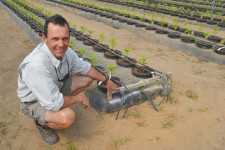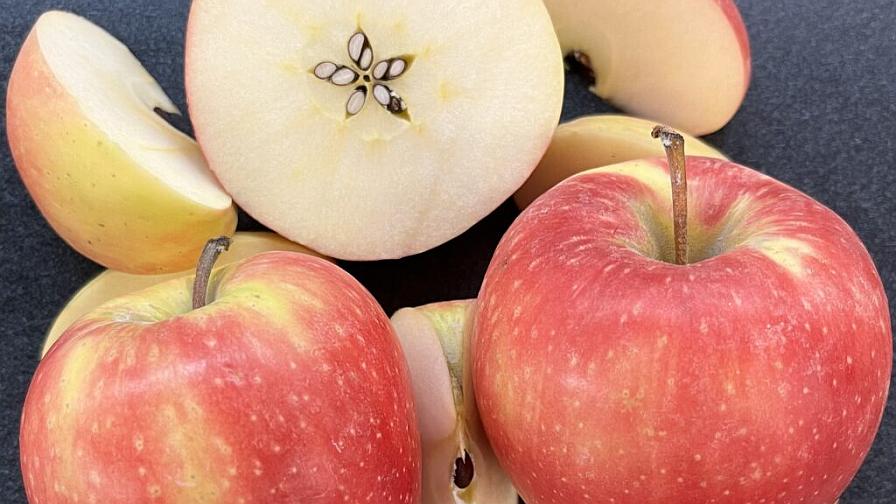Farmer On A Mission To Find A New Niche


Jay Fraleigh has been around farming all his life. In that time, he has witnessed change that is inevitable with the profession of agriculture. He comes from six generations of a farm family in the area around Madison. He cut his teeth on growing shade tobacco, which his father planted from the 1950s to 1970s. Back then, the whole area around Gaston County was dominated by Imperial Tobacco Co. Over the years since the 1840s when the farm was established, cattle and cotton also have been grown there.
While tobacco reigned in the south for many years, it began to fade and Fraleigh’s father A. H. “Rock” Fraleigh had to transition into other crops in the 1970s. He chose vegetable crops to fill the place left absent by the decline of shade tobacco.
Knowing he wanted a career in agriculture, Rock advised his son to consider landscape and nursery production. Fraleigh obtained a degree in landscape design and operations from Lake City Community College in 1986. Following several career moves in the nursery business, he founded Fraleigh Nursery in 1999 along with his wife Donna.
“We produced mostly woody ornamentals and shrubs that went into the wholesale market,” says Fraleigh.
The nursery enjoyed success for years until the housing collapse hit in 2008, which took out a large part of its customer base. Most of Fraleigh’s business was based on the housing market, so like his father with shade tobacco, he too began looking for other crops to produce at the nursery to remain viable.
“It was pretty simple,” he says. “Either we were going to close up or do something different. Fortunately, we had made some contacts within the retail grocery chain by selling floral mixes and edibles. I started talking with this customer base and asked if they would be interested in us growing vegetables. Our sustainable and local production approach is very attractive to these buyers.”
Crops like tomatoes, peppers, eggplant, squash, and cabbage are now being planted at the nursery — some under high tunnels and some in the open field. Fraleigh says his ornamental production is quickly fading away.
Market First
“I still have a long row to hoe, but we have gained a little traction,” he says. “The vegetable business can be very fickle, if not more so than ornamentals. I am just trying to carve out a niche here, but that costs money, too. Our business is still in a very fragile state, so I am not yet claiming our vegetable production is a proven success.”
“We had gotten in the door with the grocery buyers with our sustainable approach with our floral mix and edibles,” says Fraleigh. “We are not claiming to be organic, but we strive to use OMRI-approved products for pest control if conditions allow it.”
Fraleigh Finds A New Niche
Realistic Expectations
Though there is a lot made about growers getting premiums for produce that is produced in a greener and more sustainable manner, Fraleigh cautions that any premium gained is very small, if any. He contends the buy local and green approach may just mean a buyer is interested in doing business with you in a very competitive marketplace.
“If you are selling in a U-Pick or farmer’s market environment, you can capture those premiums better because you are going direct to the consumer,” he says. “The truly organic growers might be capturing a higher premium, but they better be because of what they lose in waste.
“We are selling to regional and national independent groceries and some national food service groups. We sell to some farmers market type customers as well. We have a pretty good swath of customers, which is pretty neat. But, at the end of the day, it is the perishable market that can be here one day and gone the next.”
Fraleigh’s Top Three
1 Have a market before you grow. Fraleigh emphasizes that growers better have buyers lined up before they plant the first crop. He says the fresh produce market is far too competitive to take a chance on finding a market after the fact.
2 Have mentors handy. Fraleigh says tapping into the knowledge of fellow growers and experts on best practices for raising vegetable crops is a key component to success. He says friends like Skeeter Bethea (Enza Zaden Seed) and people at UF/IFAS have been critical in his transition to vegetable crops.
3 Be prepared for perishability. Fraleigh says with his former ornamental crops, you could leave them in a container for 12 to 18 months if market conditions warrant. “Try that with a tomato,” he quips. He says the fact that vegetable crops are so perishable and the market is so fickle only reinforces the necessity of having buyers lined up before you plant.










